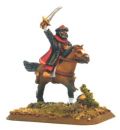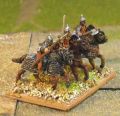Historical Overview Section
This list groans under the weight of covering everyone who enjoyed a moment in the sun between 500AD and 1000AD in and around the Tarim Basin.
The area had been variously on the fringes of Sassanid Persian, Skythian or Saka, Kushan or Indo-Skythian, Hephthalite Hunnic and all sorts of Chinese spheres of influence prior to this period, with the leading center the ancient Iranian kingdom of Khwarazm, ruled by the Afrighids of Kath. Khwarazm, was surrounded by all sides by steppe land and desert, making it geographically isolated from other areas of civilization. Before the 8th century, there had only been few ineffectual Arab Conquest and Ummayad Arab raids on the fringes of Chorasmia from the directions of Khorasan and Transoxania, but in 712 A.D., Qotayba the son of Moslem Baheli was able to intervene in a civil war between the Afrighid Shah and his brother Khorrazad. Two Arab invasions lead to much destruction as Biruni notes. Once the Arabs withdrew from their raid, the Shahs recovered power in Chorasmia and they continued to adhere to their ancestral faith, which according to Biruni was Zoroastrianism. The local shahs continued to ally with local Iranians princes, Soghdian merchances and even Turks and Chinese in order to resist the Arabs. It thus came vaguely under Muslim suzerainty, but it was not until the end of the eight century or the beginning of the ninth century that that an Afrighid was first converted to Islam. Since Khwarezm was part of the Silk Road, it was known internationally, and had several different names in several different languages.
Another major city state was that of the Kucha, an ancient Buddhist kingdom located on the branch of the Silk Road that ran along the northern edge of the Taklamakan Desert in the Tarim Basin and south of the Muzat River. Kucha was strongly influenced by Indian and Scythian thought, and Indian kings are said to have reigned there. For a long time Kucha was the most populous oasis in the Tarim Basin.
The Sogdians formed another coherent group, who used their position on the Silk road so well that that the Khotanese called all merchants suli ("Sogdian") whatever their culture or ethnicity
The city states fought off various attacks - or submitted to repeated incursions from the Late Tang to Five Dynasties Chinese, but the Arabs and Mongols finally did for them.
Using the army in FoG
- Despite the rather bland description, its not a bad list - lancers of Bw/Sw cavalry is a good option with this much flexibility
- Defensive Spearmen probably want to be taken in "bulletproof" units of 10, and can delay and fight if terrain falls against you.
- Be careful if trying to skirmish with undrilled Bw/Sw cavalry - they cant expand / contract as easily as drilled versions.
UK Tournament Results with this army
Useful Links
User-contributed links about this army:
- Tokharians and Uighurs of the Central Asian City States in Frescos from the Tarim Basin
- Kizil cave donor figures
- Kizil cave donor figures
- Cave of the Sixteen Sword Bearers
- large image
- A sketch of four other sword bearers, a servant of the Sixteen Sword Bearers
- Sketches of three sword bearers & a servant of the Sixteen Sword Bearers
- Armour on the stele of l'ui-zcika
- Eight Kings of the Relics Story
- large image
- detail of left
- detail of right
- Armour from the Sanctuary of Avalokitesvara
- [http://warfare.uphero.com/Ancient/Kizil_cave_of_the_painter-BW.htm |Armoured Cavalry in Qyzil Cave of the Painter
- Wall Paintings from a Christian Temple, Chotscho, Tarim Basin
- large image
- Warriors in Temple No. 9, Bäzäklik &
- detail
- Donors in Temple 1, Bezeklik
- Pradhi scene No. 6, Temple No. 9, Bezeklik
- detail of donors
- Pradhi scene No. 14, Temple No. 9, Bezeklik
- detail of donors
- Cavalryman in the city on the Yâr
- large image
- Tokharians and Uighurs of the City States of Central Asia in Frescos from the Tarim Basin
- Kizil cave donor figures
- detail
- Cave of the Sixteen Sword Bearers
- large image
- A sketch of four other sword bearers & a servant of the Sixteen Sword Bearers
- Sketches of three sword bearers & a servant of the Sixteen Sword Bearers
- Armour on the stele of l'ui-zcika
- Eight Kings of the Relics Story
- large image
- detail of left
- detail of right
- Armour from the Sanctuary of Avalokitesvara
- Armoured Cavalry in Qyzil Cave of the Painter
- Wall Paintings from a Christian Temple, Chotscho, Tarim Basin
- large image
- Warriors in Temple No. 9, Bäzäklik
- detail
- Donors in Temple 1, Bezeklik
- Pranidhi scene No. 6, Temple No. 9, Bezeklik
- detail of donors
- Pranidhi scene No. 14, Temple No. 9, Bezeklik
- detail of donors
- Cavalryman in the city on the Yar
- large image
- Illustrations of Druzhina Soldiers
- put the link text readers will see in here write some more detail about the link here
Allies
Put information on allied contingents here - including recommendations on which to use, and why.
Painting and Collecting the Army
- Paint schemes, insignia, shield designs? Put it here.
15mm Manufacturers supplying figures for this army
Sort of a Turkish, arabic, Mongol type vibe here. Have a look at all these armies in the Ancients Photo Gallery also on this site. This listing only covers "arabic" figures - for Hunnic/Mongol figures see the relevant pages in this Wiki

|
|

|

|
- Essex Miniatures - many generic Arabs, 2 Mongol ranges, Generic Turks
- Donnington - 35+ arabs, some Turks
- Museum Miniatures - several nice Arab/Persian/Turkish ranges, often using the same figures in each!
- Gladiator Miniatures by Fighting 15's (Previously Black Hat) 33-strong Crusades Moslems Range
- Old Glory 15's, Asiatic Horse Archer range, Turks, Mongols
- Minifigs Turkish figure range
- Irregular Miniatures 39 Arab & Turk figures from a generic range
- Lancashire Games - Several large "value" packs of Arab troops
- QRF Models - Some of the Medieval Turks and Indian cavalry are useful here.
- Tin Soldier 16 Arabs in one range
- Outpost Wargame Services A specialist in this period/region, many relevant figures
- Khurasan Miniatures again a specialist period for Khurasan, with several Persian/eastern ranges
- Viking Forge several Arab & Turkish ranges
- Battle Line Miniatures 27 Generic Arabs
- Eureka - Australian Site Grumpys Miniatures Perian & Afghan Ranges are quite fun
- 50 Paces.com their website shows an "Arab" range, but no figure codes listed
- Fire & Sword System Crimean Tatars and Cossacks make good Turkish fugures
- Jacobite Turkish range
| Army Lists |
800 pts
- IC
- 2xTC
- 7x4 Sup Armd Cav Lancer
- 2x4 LH Bw Sw
- 1x4 LH Bw
- 3x6 LF
eBay Listings
UK Bookstore
Army Lists
- IC
- 2xTC
- 7x4 Superior Lancer Cav
- 3x6 LF Bow
- 2x4 LH Bw Sw
- 1x4 LH Bw